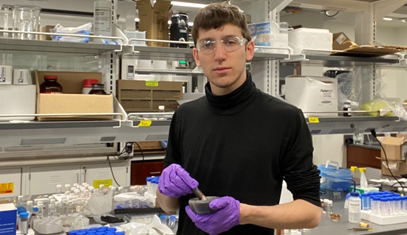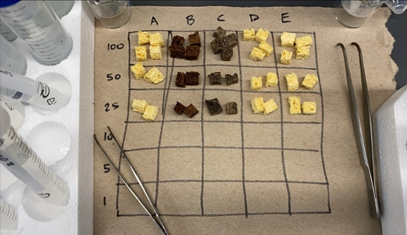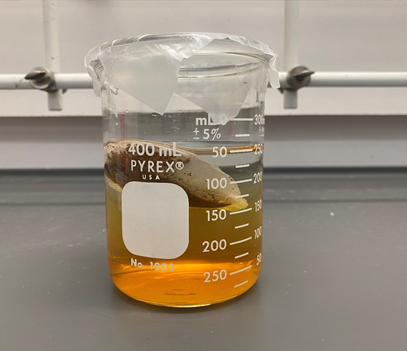
Songting Cai
Born and raised in Harbin, China, Songting Cai completed her bachelor's degree in 2016 from the Department of Materials and Physics at Harbin Institute of Technology, a research University and one of China's elite C9 League. Now a fifth year PhD candidate at Northwestern University, Songting is co-advised by Professor Vinayak P. Dravid and Professor Mercouri G. Kanatzidis's labs working on synthesis design and structural characterization of high-performance thermoelectric materials.
When not in the lab, you can find Songting engaged in activities like swimming, Yoga and Pilates; and as she hails from one of China's beautiful "Ice Cities" she learned to ice-skate and ski from a very young age!
Welcome Songting! Can you share with us a little about your research?
I started to work on thermoelectric materials when I was a freshman-the first moment I learned what research is and then never changed my direction since then. From a freshman introduction class, I have learned the power of thermoelectric materials not only as a promising energy material, but also its ability to consume waste heat that originally would be emitted to the atmosphere. I have then made up my mind to do research in this field; after graduating from college, I got admitted to Northwestern and joined the collaborative thermoelectric research team lead by the Dravid, Kantzidis, and Wolverton groups to develop fundamental understanding of complex thermoelectric materials.
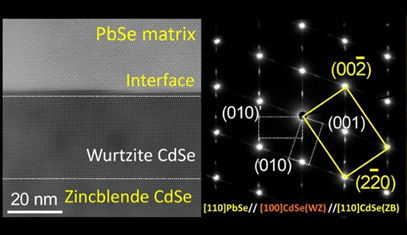
Core-shell architecture in nanostructured PbSe-CdSe thermoelectric materials and the corresponding electron diffraction pattern. Image taken using the JEOL ARM 200
What inspired you to be in your current field of study?
As we all know, climate changes is one of the biggest concerns regarding nowadays environmental problems, and fossil fuel burning is the primary cause to it. It is remarkable to learn that globally almost 60% of all used energy is lost and most of it as heat losses. Thermoelectric (TE) materials or devices can enable direct energy conversion for the direct generation of electrical power from waste heat even in extreme environments; therefore, TE heat energy harvesting is among the most promising approaches for improving the management of energy produced from traditional fossil fuels and may aid in increasing global energy efficiency and reducing the emission of carbon dioxide. I have long been interested in using my expertise in materials science to make connections between saving the environment and benefiting basic human needs; that's why thermoelectrics became my choice of study for almost nine years.
Although the field of thermoelectric materials has grown substantially in the last decade, and many research teams have played significant roles in its continued development. Widespread uses, however, are still lagging and it is mainly ascribed to the low TE energy conversion efficiency, high cost of TE materials, and slow progress of reliable module development. Therefore, there continue to be substantial scientific knowledge gaps in our fundamental understanding of TE materials and it is essential to continue to develop advanced concepts that will ultimately lead to next generation materials with an even more enhanced thermoelectric performance. Whenever there are challenges, there will be many interesting and inspiring scientific questions that need to be answered, and these questions remind me that there is still a long way to go.
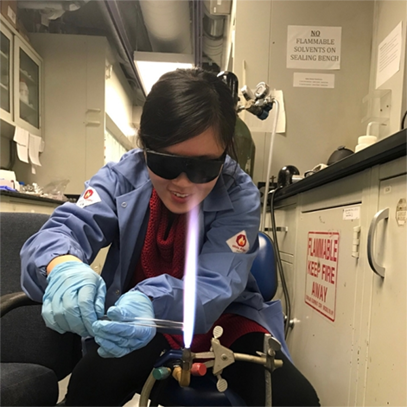
What are your aspirations for your research?
The deeper we dig into a research field, the more clear it is to us how much we don't know and how much more solutions we need to figure out, which sometimes can be a little bit overwhelming. But my personal hope is that our studies can raise attention to different organizations, institutions, and individuals on the importance of developing next generation clean energy sources-for our planet, and thus for ourselves.
What, in your opinion, are the biggest challenges facing climate research?
I think in many Nations, the education in climate change to the public is far from enough. As most people are either not aware of it as an urgent problem, or they don't know exactly what to do to help. We researchers need to contribute more to environmental publicity and education, not only our research results themselves.
What are some everyday things we can all do to positively impact our environment?
As it's getting warmer outside, try to go for a walk or ride a bike instead of driving once in a while! We can all save our environment while get some fresh air and exercise!
Do you think the current quarantine due to Covid-19 will have an impact on climate change? If so, how?
Some reports suggested that since there have been less activities outside, the pollution or greenhouse gases emissions are decreased. Although I don't think this should be regarded as a 'good news' under such circumstances, we can indeed make a comparison and see more clearly how much we have been negatively affecting our planet.

